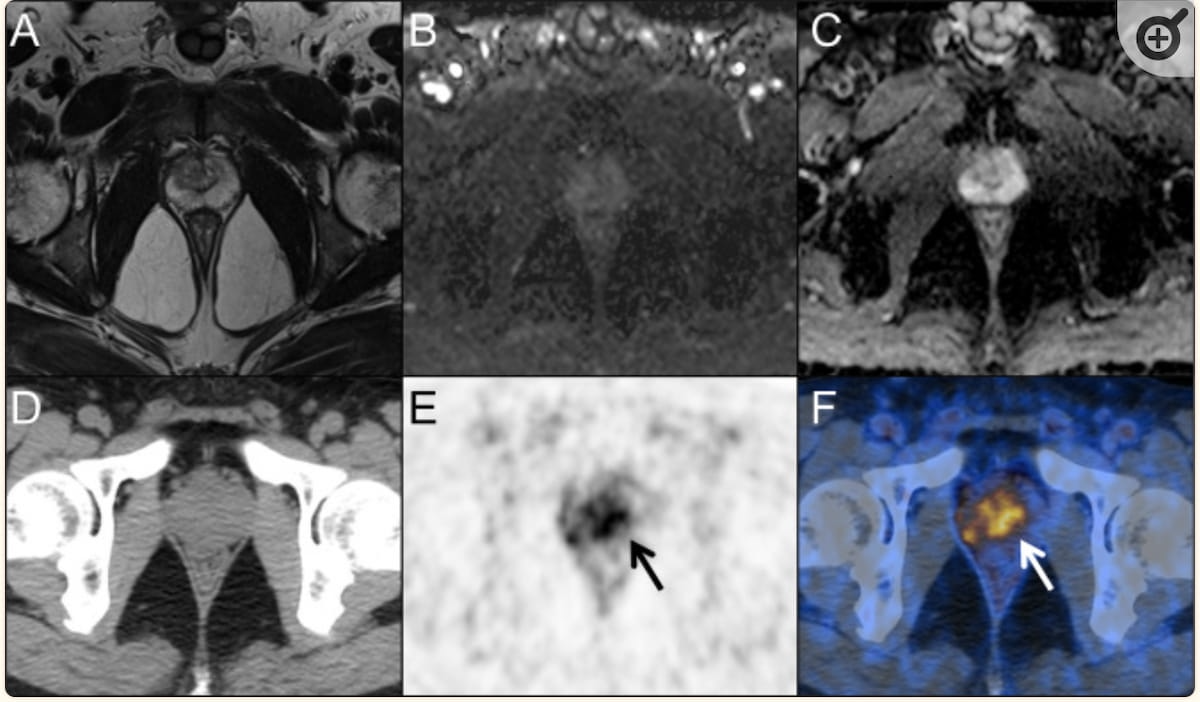Study: PET/CT Multivariate Model Enhances Accuracy for Diagnosing Prostate Cancer
For men with PSA scores between 4 to 10 ng/mL, a multivariate prediction model that incorporates 68Ga-PSMA PET/CT had a 92.7 AUC for predicting clinically significant prostate cancer, according to newly published research.
Could the use of 68Ga-prostate-specific membrane antigen (PSMA) positron emission tomography/computed tomography (PET/CT) significantly improve prostate cancer detection in patients with prostate-specific antigen (PSA) levels ranging between 4 to 10 ng/mL?
Emerging research suggests that a multivariate prediction model, which incorporates the PSMA PET/CT agent, is 34 percent more effective than PSA testing alone and 27 percent more effective than multiparametric magnetic resonance imaging (mpMRI) alone in detecting clinically significant prostate cancer (csPCa) in this patient population.
For the study, recently published in Cancer Imaging, researchers reviewed data from 81 patients with total PSA (TPSA) levels between 4 and 10 ng/mL. All patients had prostate mpMRI, 68Ga-PSMA PET/CT and systematic transrectal ultrasound (TRUS)/MRI/PET fusion-guided prostate biopsy, according to the study. The researchers noted that 29 men had csPCa and 52 men had non-csPCa.
The researchers found the multivariate prediction model, which included prostate volume (PV), free PSA (PSA)/TPSA and maximal standardized uptake value with 68Ga-PSMA PET/CT, had a 92.7 area under the receiver operating characteristic curve (AUC) for predicting csPCa. In comparison, the study authors noted a 58.5 AUC for PSA alone, a 65.2 AUC for mpMRI alone and an 85 percent AUC for 68Ga-PSMA PET/CT alone.
Magnetic resonance imaging (MRI) did not show any malignant lesions (images A-C) in a 55-year-old man with elevated PSA levels ranging from 4.37 to 6.82 ng/mL over a one-year period. However, the positron emission tomography/computed tomography images (PET/CT) demonstrate increased prostate-specific membrane antigen (PSMA) uptake (see arrows in images E and F). Subsequent biopsy results revealed Gleason score 4 + 3 prostate cancer. (Images courtesy of Cancer Imaging.)

The predictive model incorporating 68Ga-PSMA PET/CT also demonstrated an 86.21 percent sensitivity rate and an 86.54 percent specificity rate for predicting csPCa, according to the researchers.
“During the early diagnosis of csPCa, the 68Ga-PSMA PET/CT SUVmax-based prediction model is a much better diagnostic method than PSA-based tests, as revealed by the larger AUC value and higher sensitivity and specificity of this test than those of PSA- and mpMRI-based tests,” wrote lead study author Jinhui Yang, M.D., who is affiliated with the Department of Nuclear Medicine at Xiangya Hospital at Central South University in Changsha, China, and colleagues.
In comparison to patients with non-csPCa, the researchers noted that study participants with csPCa had larger PSA density (median PSAD of 0.21 ng/mL2), a lower median FPSA/TPSA (0.12) and a smaller median prostate volume (31.40 mL).
“ … We have developed a simple predictive model combining the SUVmax based on 68Ga-PSMA PET/CT with traditional clinical risk factors, which can achieve a highly accurate and noninvasive diagnosis of (csPCa) in patients falling within the PSA gray zone,” added Dr. Yang and colleagues. “ … The combination of 68Ga-PSMA PET/CT and PSA tests provides a good performance-efficiency-diagnostic model to improve the net benefit and reduce the number of unnecessary prostate biopsies.”
In regard to study limitations, the researchers acknowledged a relatively small sample size with the retrospective single-center study. The study authors also noted a lack of randomization with the study cohort and the use of multiple biopsy methods for pathological reference standards.
Newsletter
Stay at the forefront of radiology with the Diagnostic Imaging newsletter, delivering the latest news, clinical insights, and imaging advancements for today’s radiologists.
Multinational Study Reaffirms Value of Adjunctive AI for Prostate MRI
June 16th 2025The use of adjunctive AI in biparametric prostate MRI exams led to 3.3 percent and 3.4 percent increases in the AUC and specificity, respectively, for clinically significant prostate cancer (csPCa) in a 360-person cohort drawn from 53 facilities.
New PSMA PET Prep Product Now Available in the U.S.
June 11th 2025Offering an extended shelf life, the FDA-approved Gozellix, a preparation kit for gallium-68 (68Ga) gozetotide injection, is indicated for use in PSMA PET imaging of prostate cancer patients with suspected recurrence or metastasis.
Study: AI-Generated ADC Maps from MRI More Than Double Specificity in Prostate Cancer Detection
June 5th 2025Emerging research showed that AI-generated ADC mapping from MRI led to significant increases in accuracy, PPV and specificity in comparison to conventional ADC mapping while achieving a 93 percent sensitivity for PCa.